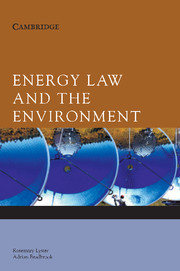Book contents
- Frontmatter
- Contents
- List of figures & tables
- Table of cases
- Table of statutes
- Preface
- 1 Overview of energy production and use in Australia
- 2 Energy technologies and sustainable development
- 3 Energy, international environmental law and sustainable development
- 4 Predicting the RPP for any given year
- 5 Sustainable energy in the Australian electricity and gas sectors
- 6 State government initiatives on energy and the environment
- 7 A sustainable energy law future for Australia
- Appendix A Draft non-legally binding Statement of Principles for a Global Consensus on Sustainable Energy Production and Consumption
- Appendix B Draft Protocol on Energy Efficiency and Renewable Energy to the United Nations Framework Convention on Climate Change
- Index
Appendix A - Draft non-legally binding Statement of Principles for a Global Consensus on Sustainable Energy Production and Consumption
Published online by Cambridge University Press: 05 June 2012
- Frontmatter
- Contents
- List of figures & tables
- Table of cases
- Table of statutes
- Preface
- 1 Overview of energy production and use in Australia
- 2 Energy technologies and sustainable development
- 3 Energy, international environmental law and sustainable development
- 4 Predicting the RPP for any given year
- 5 Sustainable energy in the Australian electricity and gas sectors
- 6 State government initiatives on energy and the environment
- 7 A sustainable energy law future for Australia
- Appendix A Draft non-legally binding Statement of Principles for a Global Consensus on Sustainable Energy Production and Consumption
- Appendix B Draft Protocol on Energy Efficiency and Renewable Energy to the United Nations Framework Convention on Climate Change
- Index
Summary
Preamble
(a) Access to clean and affordable energy is a precondition for all social and economic development. These Guidelines endeavour to lay out a universally acceptable framework for national policies and international cooperation in pursuit of the sustainable development objectives laid out in Agenda 21. Adherence to these guidelines is expected to facilitate the achievement of ‘a sustainable energy future for all’.
(b) Energy resources should be sustainably managed to meet the social, economic and ecological needs of present and future generations. The currently prevailing patterns of energy production and consumption are predominantly based on finite fossil fuel reserves and are therefore not sustainable in a longer term perspective. Growing environmental concerns also call for a stringent review of energy policies.
(c) Unsustainable patterns of energy production and consumption threaten to harm the global environment. Industrialized countries should take the lead in achieving sustainable energy production and consumption patterns; developing countries should seek to achieve sustainable energy production and consumption patterns in their development process, having due regard to the principle of common but differentiated responsibilities. The special situation and needs of developing countries in this regard should be fully taken into account.
(d) States should strive to promote an international economic climate conducive to the continued and environmentally sound development of sustainable energy production and consumption in all countries.
- Type
- Chapter
- Information
- Energy Law and the Environment , pp. 208 - 214Publisher: Cambridge University PressPrint publication year: 2006



